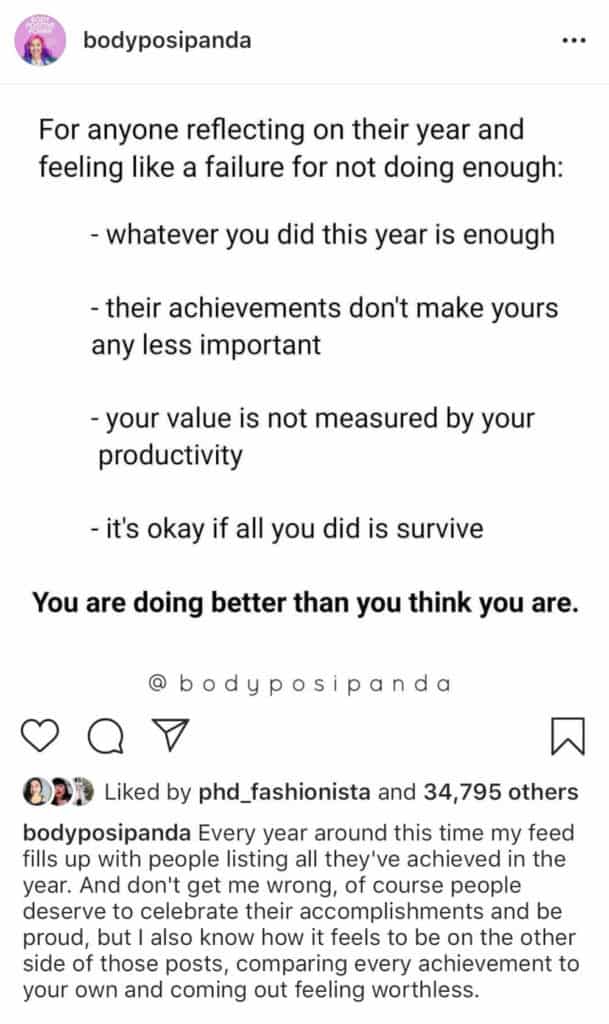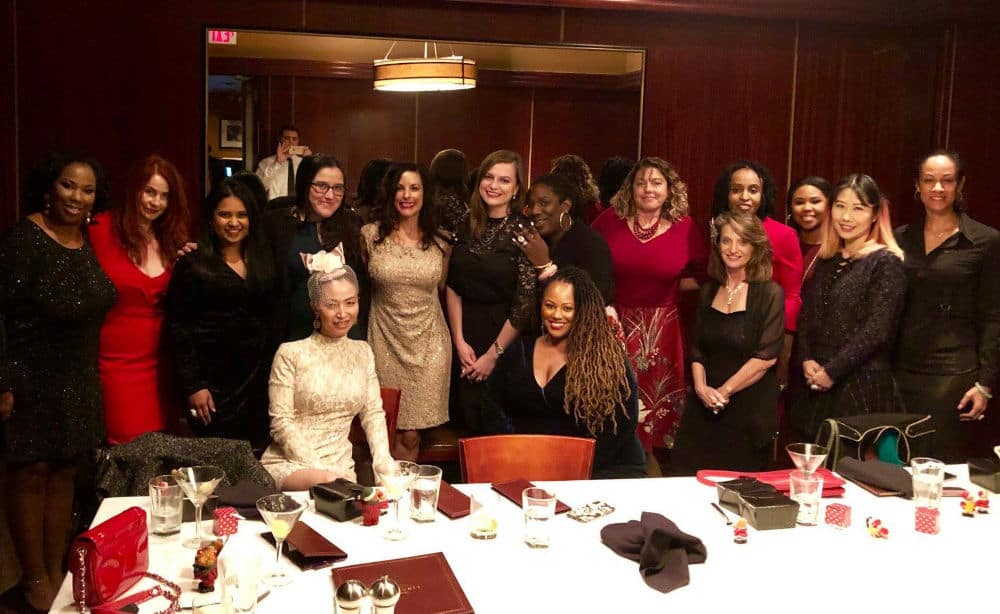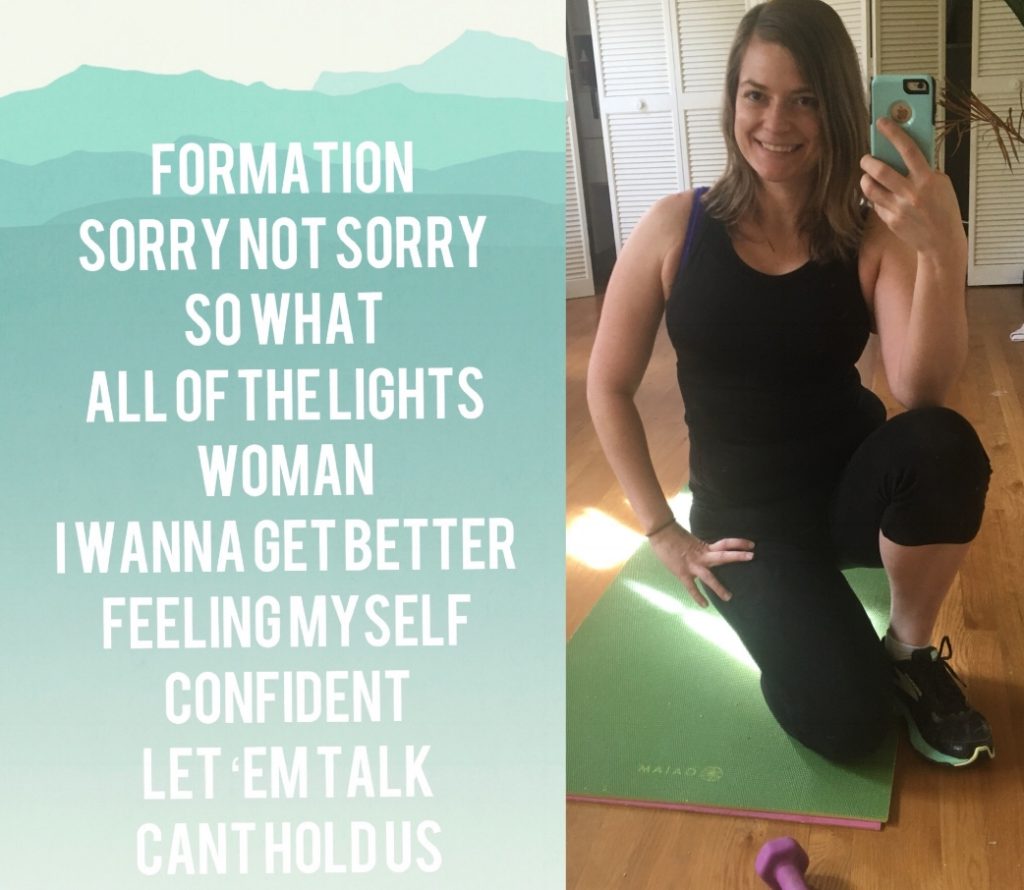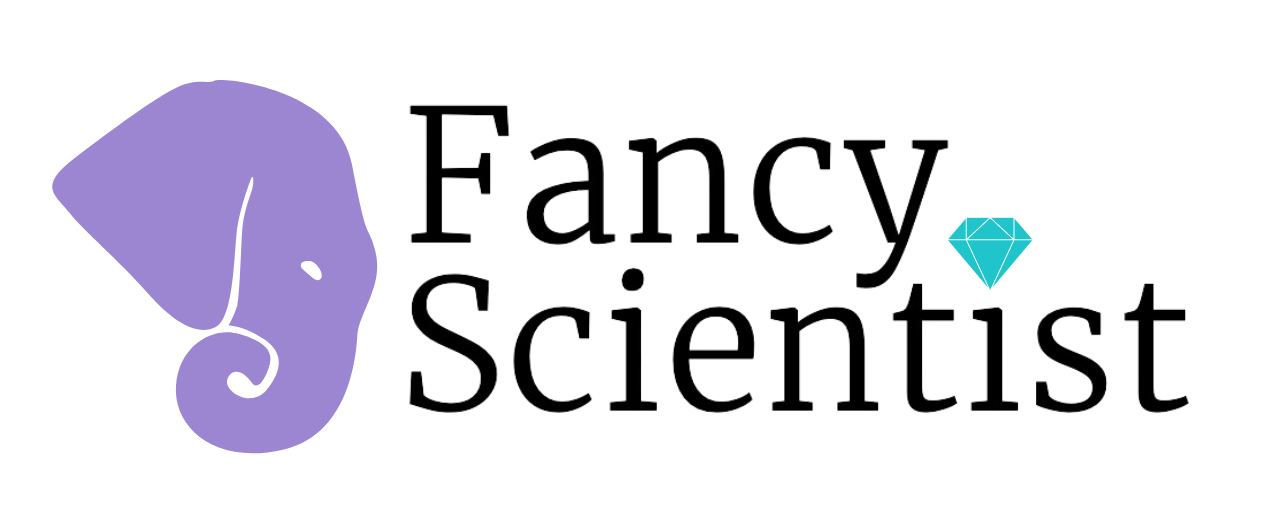*This post contains affiliate links. This means when you make a purchase, I get a commission at no cost to you! Read more about my affiliates on my Affiliate Links Disclaimer.
It’s that time of year. Everyone starts talking about what a good year it’s been by posting summaries of all their accomplishments. But scrolling through your social media might not be such a positive experience for you. If you had a bad year, it can be a reminder of all of the things you didn’t accomplish, and the goals that fell short. Or maybe it was a fine year, but it can’t be measured in tangible items like awards granted or publications. This is exactly how I felt last year.
I was supposed to write a blog post about my year in review, specifically the scientific papers I wrote. I worked my butt of that year, but when it came time to write down about my publications, I realized I only had one paper, and it was a non-research paper in an education journal (which wouldn’t count for research scientists). I hadn’t felt bad about myself until then. Writing up this final report pointed out the ways where I fell short.
Instagram just made me feel worse. No one was posting about their lack of publications or other ways they fell short. Everyone was happy, successful, and proud of their year. I couldn’t find any academics who were talking about just surviving.
Academic over-achievement tweets getting you down? I've procrastinated something that was due a year ago, pushed something else back by six months as I really can't be arsed & have about 4 months to write 80,000 words. I file paperwork on the floor & drink too much. Merry Xmas!😂
— drdeininger.bsky.social (@dr_deininger) December 22, 2018
Where I did find comfort was in the body positive community. I have a history of eating disorders, and follow accounts of people who now embrace their bodies as they are (who often survivors of eating disorders too). These accounts often post messages of support. Why would these messages be helpful for an academic?
My underlying desire in academia and my body has been perfection and achievement. In other words, looking for gold stars wherever I could. But this never worked. No matter what weight I was, it was never good enough. I could always find places to lose more and areas get toned. The same is true for academia. No matter what I accomplished, I could always do more. I was always too hard on myself. The end result was always to feel bad over goals not accomplished.
Recovery from my eating disorder involved a lot of self talk with messages of kindness, compassion, and acceptance for my body. Repeating these messages for my body started to carry over into other aspects of my life where I was being hard on myself, notably my career. Feeling bad about yourself is not a way to live your one and only life, or even be a productive and passionate scientist. Something had to change.

After being triggered to feel bad about myself last year, I had to do some real work to bring myself back up. Here’s some of the tactics I used to overcome an academic depression, in addition to others I’ve learned from over the years, from dealing with academic setbacks.
1. Write a “Ta Da” List
I stole this idea from Gretchen Rubin, author of The Happiness Project. You write a list of all of the things you did do throughout the year to remind yourself you haven’t been a slacker! While I didn’t have scientific publications to speak of, I did have a lot of other accomplishments. For instance, I submitted two National Science Foundation grants with million dollar budgets. Regardless of whether the grant was funded, this was a large amount of work and something to be proud of for accomplishing. Writing a “Ta Da” list also made me realize that even though my papers weren’t out, I had several close to submission meaning next year would be a good one for publishing.
2. Know You are So Much More than Your Career
So often, we tie up our identities and self-worth to our careers. I think this is especially easy for academics to do because we pursue our profession out of love and passion, and not because it is just a job or for the money. But we also have to realize life is so much more. Yes, I am a scientist, but I am also a wife, a friend, sister, daughter, aunt, artist, writer, creative spirit, and so much more. We are more than the number of grants we get or publications we have. This month, my brother-in-law passed away from cancer. He was only about 10 years older then me. We don’t ever know how long we have here. Do you really want to spend your time hating yourself because of a publication?
3. Surround Yourself with People Outside of Your Career
In graduate school, all of my friends were scientists. When we would get together, the conversation would undoubtably turn to science. This was often a reminder of all of the work I had to do or what I didn’t accomplish. When I moved to Raleigh, I made a conscious decision to make friends with people outside of science. I joined Meetup, and now, almost all of my friends are non-scientists. When we go out, we hardly ever talk about my research, and this is a time where I can truly not think about work and just have fun.

If you’re feeling in an academic depression, schedule a night out with friends or join (or start) a Meetup group and attend your first event. I’m the organizer for two meetup groups, one on blogging and one on female friends.
4. Words of Affirmation
At first, I hated words of affirmation. I felt like Stuat Smalley (“I’m good enough, I’m smart enough, and doggone it, people like me”). I tried to believe them, but I was so wired for a certain way of thinking that quite honestly, my brain and body outright rejected them. They backfired. So why am I including them here? Because when you start off very small, they can eventually work for you.
At first, I don’t even recommend starting with positive phrases, but neutral ones. For example, if your internal dialogue sounds something like this: “I am a failure. I shouldn’t be a scientist. I am not good enough. I should quit.” Try starting with: “I belong here. I was accepted into a Ph.D. program, which means I am qualified to do the work.” I literally write my words of affirmation on cards, put them in places where I can see them, and repeat them to myself. Once you start believing neutral words of affirmation, you can try to add some more positive phrases such as, “I am a good scientist. I am doing important and interesting research.” The important thing is that it has to be something that you can (eventually) believe in and relate to.
5. Adjust Your Goals
One of the biggest things I’ve learned from being a scientist is that things take WAY longer than you predict. I am still learning this lesson. Some of my projections for finishing projects have been years off. Just getting a manuscript to publication after submission takes a year. Maybe your goals are completely unrealistic and you just need more time.
6. Or Eliminate Goals
Maybe you don’t need goals! Or your goals don’t need to be in a year-long framework. You can’t feel bad about yourself if you don’t have arbitrary targets for yourself. Lots of people think that you can’t make progress without goals. I completely disagree. I used to plan my year out and pretty much fell short every time. I think it’s better to implement short-term goals on a month-by-month basis. Goals over the course of a year are much harder because as I mentioned before, things usually take a lot longer than you expect, or essential things pop up that you need to attend to, that can delay your progress. A year is an arbitrary deadline.
7. Reframe Your Thinking
This is one I have more recently learned through listening to entrepreneurial podcasts like The Tim Ferriss Show and Smart Passive Income. First off, failure is 100% part of science. You can’t avoid it. Not all of your research/experiments will work, journals and grant agencies will reject you. You have to get used to it.
Successful entrepreneurs look at failure as important lessons. Without failures, you cannot grow as a company or individual. It doesn’t even have to be an obvert failure. So often I thought of myself as a failure because I didn’t finish something on time (one of my arbitrary goals) or didn’t work fast enough. But going through this process always taught me something. Going slow the first time may help me go faster or taught me valuable lessons on how to set it up something better for next time. For more on this topic, read the section, Ask “What Can I Learn From This?” from “5 Mindset Shifts for Traveling Alone.”
8. Listen to Music
It’s hard to be in a bad mood when your favorite song is playing. For a quick, yet effective, mindset shift, play music you love. This is especially effective when combined with the next tip, exercise. For song suggestions to get you up and going, try “10 Songs to Boost Your Confidence.”

9. Exercise
Exercise is effective for several reasons. One, it immediately gets you out of your head. When you are sweating and out of breath, you are not thinking about science. It’s innately physical which gives your mental self a break. Two, it releases endorphins, which make you feel good. Not getting exercise is a deal-breaker for me in my career. I make sure to exercise almost every day before anything else because it has such a profound impact on my mental health and overall wellbeing.
10. Visit a Classroom or Skype a Scientist
This one is actually my favorites and I think a game-changer. When I first visited a classroom, I was in a major academic depression. I was approaching the end of my Ph.D. and I felt super overwhelmed by all I had to do. I felt like nothing was working out the way I wanted it too and became frustrated when I couldn’t get important samples to work at all. Instead of a Teaching Assistant position, I became part of a program where scientists worked with K-12 teachers in their classrooms. When I gave my first talk to the students, I was lifted out of my depression.
The kids were so excited just to hear me speak. They reminded me that my research, despite its perceived failures at the time, was extremely cool. I studied forest elephants, which is an easy sell to kids, but I guarantee whatever your research is on, they will think it is super cool. Conduct research in a lab? Look through a microscope? Work with DNA? With chemicals? All of those things are exciting to name a few. They will make you feel like a rockstar.
To speak to a classroom, email local K-12 teachers. I recommend grades 4 and up. Grades 4, 5, and 6 are the best because kids are not yet “too cool” to be interested in science and still show excitement (higher grades are still excited, but they conceal their excitement more). Many teachers will be delighted to have you! You can also enroll in the Skype a Scientist program, which matches teachers looking for scientists to talk to.
Getting out of an academic depression takes work, but it is worth it. Keep at it and for more mental health resources, read “12 Free Things That Help My Career (and Happiness).”
Love this post? Share it with friends!



